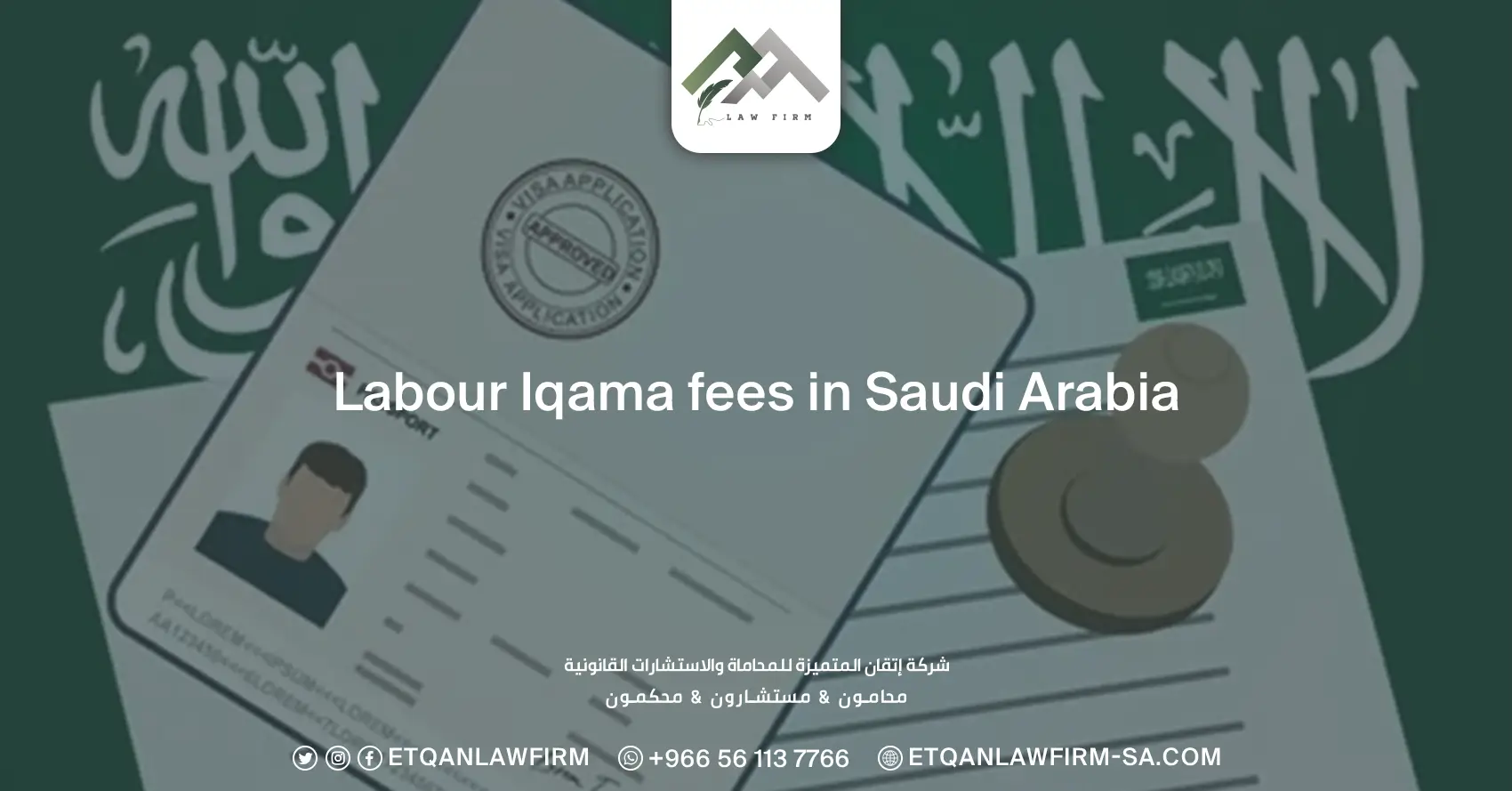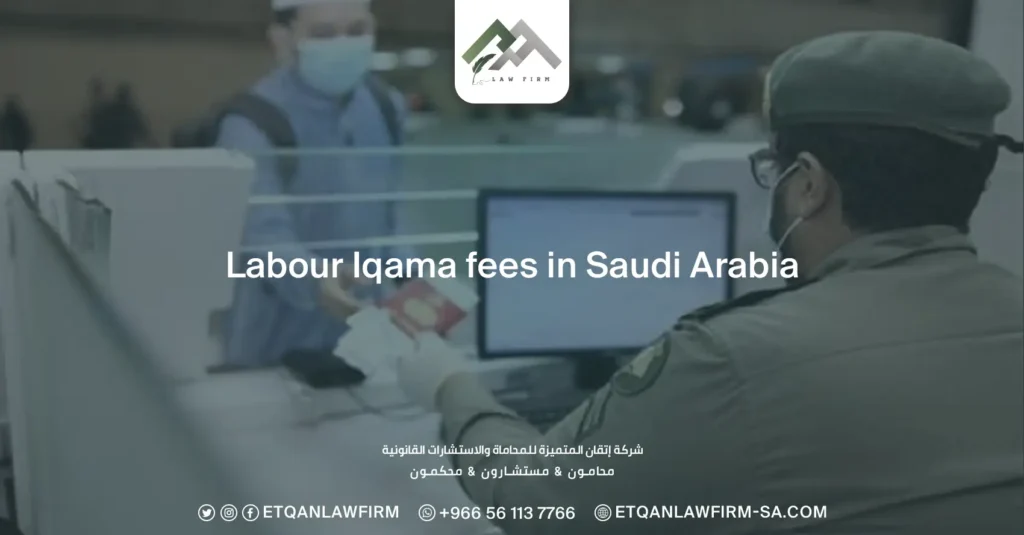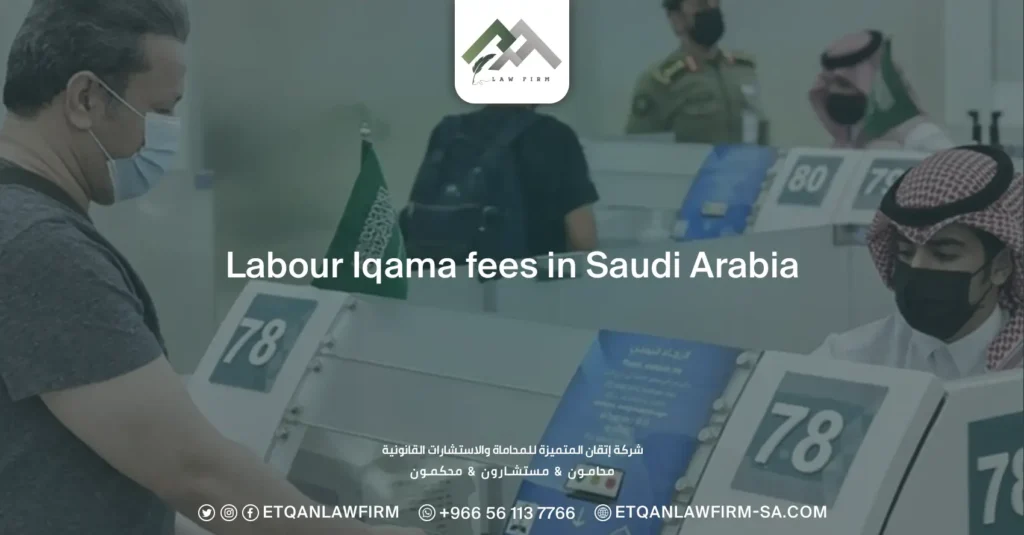
Understanding the structure of Labour Iqama fees in Saudi Arabia is essential for every expatriate worker and employer operating in the Kingdom. These fees are part of the broader legal framework that governs residency, employment, and family sponsorship for foreign nationals. In 2025, the cost of maintaining valid residency goes beyond a single fee—it includes multiple components such as issuance or renewal charges, work permit Saudi Arabia, and dependent-related fees.
This guide outlines the key types of Labour Iqama fees, associated additional costs, and how to calculate your total expenditure accurately
المحتويات
Types of Labour Iqama Fees in Saudi Arabia (2025)
Labour Iqama Fees in Saudi Arabia fall under three main categories:
1. Iqama Issuance and Renewal Fees
- The fee depends on the selected duration of residency.
- The cost structure is as follows:
- SAR 163 for 3 months
- SAR 325 for 6 months
- SAR 488 for 9 months
- SAR 650 for a full year (12 months)
- These fees are usually paid by the employer, as mandated by Saudi labor regulations.

2. Expat Levy (Work Permit Fees / Maktab Amal)
- Imposed by the Ministry of Human Resources on each expatriate worker.
- The monthly fee is approximately SAR 800 per worker.
- It can be paid monthly or in lump sums for 3, 6, or 12 months.
- The employer is fully responsible for paying these fees; it is illegal to deduct them from the employee’s salary.
- The amount may vary depending on the Saudization (Nitaqat) level—lower Saudization typically results in higher fees.
3. Dependent and Companion Iqama Fees
- These are charged for each family member under the sponsorship of the expatriate (such as a spouse or children).
- The monthly fee for each dependent is SAR 400.
- The total amount depends on the duration of residency:
- SAR 1,200 for 3 months
- SAR 2,400 for 6 months
- SAR 3,600 for 9 months
- SAR 4,800 for 12 months
- These fees must be paid in advance at the time of Iqama issuance or renewal.
- The worker is personally responsible for paying these dependent fees, unless the employment contract or company policy explicitly states otherwise.
Read More: From Fees to Insurance: Iqama Renewal in Saudi Arabia Just Got Easier
Additional Costs to Consider
When planning your Iqama-related budget in Saudi Arabia, keep in mind that expenses go beyond just the basic fees. There are several other important costs you should account for:
- Mandatory Health Insurance: Every expatriate must have valid health insurance. The cost varies depending on the provider and level of coverage.
- Late Renewal Penalties: Failing to renew your Iqama on time can result in escalating penalties:
- SAR 500 for the first delay.SAR 1,000 for the second delay.
- A third delay may lead to deportation from the Kingdom.
- Other Potential Fees: Some transactions may involve additional charges such as administrative or digital service fees (e.g., through the Absher platform or Passport Office). These are typically covered by the employer, but in some cases, employees may bear them if not contractually protected.
How to Calculate Your Total Labour Iqama Fees in Saudi Arabia?
To accurately estimate your total Iqama expenses, you should add together:
- Your personal Iqama renewal fee,
- The work permit (Maktab Amal) fee,
- And the dependent fee multiplied by the number of dependents (if applicable).

Simple calculation formula:
Total Fees = Iqama Fee + Maktab Amal Fee + (Dependent Fee × Number of Dependents).
Read More: Master the Iqama in Saudi Arabia Process Step by Step
Conclusion
Understanding Labour Iqama fees in Saudi Arabia is essential for both employees and employers. If you encounter legal complications related to Iqama fees or disputes over who should bear the costs, Etqan Law Firm offers specialized legal support and professional guidance. Their team ensures your rights are protected and that all procedures are handled accurately and in full compliance with Saudi law.
The Etqan Al Mutamayza Law Firm is ready to provide the essential support you need. You can reach their team at the following mobile numbers: +96656113776, +966541110440, +966504315333.
Additionally, feel free to visit our branches located at:
- Jeddah: Al-Aziziyah District, Mohammed bin Abdulaziz Street (Tahlia)
- Riyadh: King Abdulaziz Street, across from the Kingdom Tower
- Dammam: Al-Ashri’a Street, Al-Badeea, Dammam 32415.
FAQ
What is the fee for 1-year Iqama?
The standard fee for a 1-year Iqama (residency permit) in Saudi Arabia is SAR 650. However, this amount may vary depending on the type of profession, employer sector, and whether the employer meets Saudization (Nitaqat) requirements.
How much is the Iqama fee?
The Iqama fee includes several components:
Residency issuance or renewal: SAR 750 (annually)
Work permit fee: Up to SAR 6,000 per year
Health insurance: Typically ranges from SAR 400 to SAR 1,000 annually depending on the insurance provider and coverage
Dependent fee (if applicable): SAR 400/month per dependent
Employers usually pay the Iqama and work permit fees for employees, but this can vary.
What are the 7 types of Iqama?
Saudi Arabia offers various types of Iqama depending on the individual’s purpose of stay. Common types include:
Work Iqama – for expatriates with employment contracts
Dependent Iqama – for family members of expatriate workers
Student Iqama – for international students enrolled in Saudi institutions
Domestic Worker Iqama – for housemaids, drivers, etc.
Investor Iqama – for foreign investors and business owners
Temporary Iqama – short-term residency for specific roles/projects
Premium Residency (Green Card equivalent) – for long-term residency without a sponsor
How to check Iqama labour fees?
You can check labor-related fees (such as work permit fees) through the Ministry of Human Resources and Social Development (MLSD) portal:
Visit the Ministry of Human Resources and Social Development.
Navigate to “E-Services” > “Work Permit Services”
Log in using your credentials (Absher or Muqeem access)
Enter the worker’s Iqama number or border number
The system will show applicable labor and permit fees, including payment status
